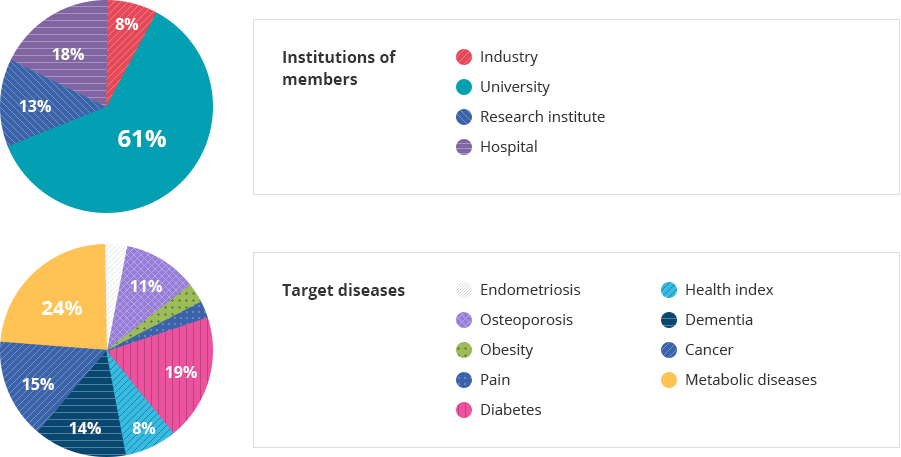contents area
Korean Chip Project
detail content area

Korean Chip Project
Introduction
The Korean Chip Project is a genome-based chronic disease study project aimed at identifying the genetic causes of common chronic diseases of Korean people. We develop Korean chip for genomic analysis, and produce and analyze gene information of about 180,000 Korean people based on large-scale cohorts.
Background
- Preexisting multi-ethnic genome chips are not suitable for genome research on Asian races such as Koreans.
Genome chip: A genome chip, which is ten times smaller than a coin, is an experimental platform used for genome researches. A chip can contain information on hundreds of thousands of genetic variations.
- In addition, preexisting genome chips do not contain information of newly discovered genetic variations by sequencing technologies.
Genetic variation: All humans share 99% of the same DNA. The remaining 1% makes a difference. 1% determines different genetic information called genetic variation. Genetic variation is known to affect diseases and phenotypes such as height, hair, and eye color.
- Although Next Generation Sequencing (NGS) has been widely used, it is not suitable for large-scale genome research on large population groups. (NGS requires high computing power and are five to ten times more expensive than genome chips)
- In order to overcome the shortcomings of the preexisting techniques, many nations leading genome research such as the U.S. and the U.K. are developing or utilizing genome chips optimized for their own genomes.
| Country | Year | No. of Samples | Project |
|---|---|---|---|
| U.S. | 2011 | 100,000 | UCSF-Kaiser RPGEH study |
| U.K. | 2013 | 500,000 | UK Biobank |
| China | 2014 | 15,000 | Chinese Kadoorie Biobank |
| Japan | 2016 | - | Tohoku Mega Biobank |
UCSF: University of California San Francisco
RPGEH: The Research Program on Genes, Environment, and Health
Overview
- We have collected information of genetic variation relating to chronic diseases and genetic characteristics of Korean people and finally succeeded in developing a Korean Chip (KORV1.0) containing information of 833,000 specific genetic variations of Korean people in 2014.
Information of genetic information collected from sequencing data of 2,500 Korean people was included.
- A total of four advisory conferences were held for consultation and verification.
Standardization of genome information
Producing standardized large-scale genome information of Korean people using the Korean Chip
Budget reductions
The Korean Chip can save up to 100 billion won of the national R&D budget compared to preexisting commercial genome chips. (Based on analysis of 250,000 samples)
The Korean Chip has been used for about 25,000 samples and reduced 10 billion won of the national R&D budget thus far.
Spread of genome research
100 disease genome experts (senior researchers or equivalent) participated in the Korean Chip Consortium to promote genome research and secure information for precision medicine.Figure 1. Korean Chip design process

screening array → fully customized → korean chip(Accuracy 99.5%, reproudcibility 99.5%)
- Imputation Backbon(MAF > 5%, genome coverage > 85%(r²>0.8))
- Exonic variants, eQTL, ADME markers
- GWAS hits forensic markers, etc.
- About 0.83M variants
Figure 2. Korean Chip Prototype

Contents of Korean Chip
| Category | Contents | No. of markers | No. of accumulated markers |
|---|---|---|---|
| Functional genetic variation (Frequency ≥ 0.1%) |
Genetic variation in protein structural change (Nonsynonymous) |
148.8K | 148.8K |
| Functional genetic variation (Frequency < 0.1%) |
Causing protein dysfunction (Predicted to be damaging) |
44.5K | 193.3K |
| Other functional genetic variation |
|
54.4K | 247.7K |
| Tagging variant | 95% (Frequency >5%) 73% (Frequency 1-5%) |
585.3K | 833K |
*K = 1,000, MAF: Minor Allele Frequency
Korean Chip Consortium
- In order to maximize the utilization of Korean Chips, we have formed the Korean Chip Consortium consisting of experts of various fields in 2016.
- About 100 experts (senior researchers or equivalent) have been participating in the consortium and conducting various genome research relating to diseases.
- Participants: About 100 Korean experts of genome research
- Research subjects: Metabolic diseases, diabetes, obesity, cancer, dementia, etc.
Figure 3. Participants of Korean Chip Consortium and Research Subjects

Institutions of members
Industry 8%University 61%
Research institute 13%
Hospital 18%
Target diseases
Osteoporosis 11%Diabetes 19%
Health index 8%
Dementia 14%
Cancer 15%
Metabolic diseases 24%
Other Endometriosis, Obesity, Pain
- About 250,000 samples of genome information will be analyzed.
- (Korea National Institute of Health) Produces and data release of genome information of about 180,000 samples
- (Korean researchers) Produces and utilizes disease genome information of about 70,000 samples (As of December 2016)
- The website of the Korean Chip Consortium (www.koreanchip.org)
Support for utilization of Korean Chip
- Provides Korean Chip quality control and analysis protocol
- Education of Korean Chip Analysis (2016 Statistical Genetics Workshop, Korean Chip Data QC Workshop, etc.)
- Support for genetic analysis using the Korea National Institute of Health’s super computer
